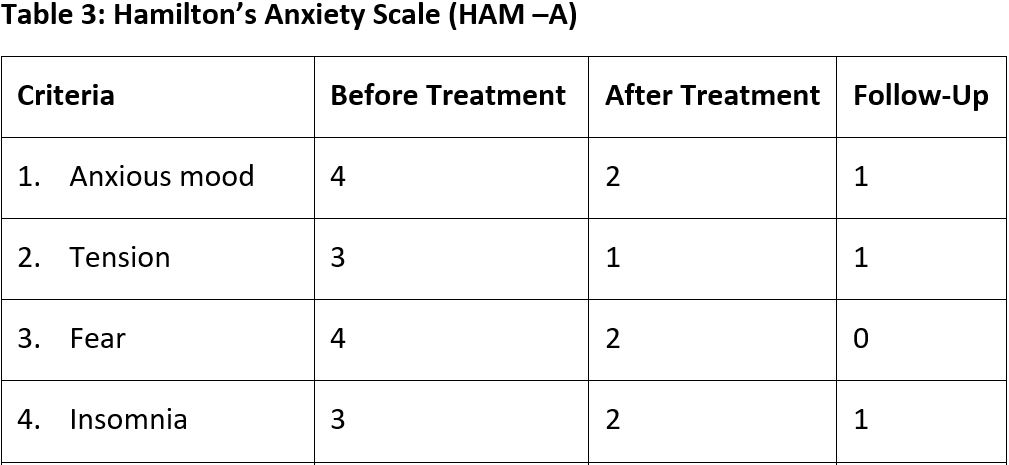Combined effect of Virechana and Rose Water Shirodhara on Hamilton’s Anxiety Scale
DOI:
https://doi.org/10.21760/jaims.10.8.61Keywords:
Anxiety, Chittodwega, Shirodhara, Virechana, Hamilton’s anxiety scaleAbstract
Generalized Anxiety Disorder (GAD) is a common and disabling condition characterized by ongoing worry, anxiety, and tension about various daily concerns, persisting for at least six months.[1] The symptoms of GAD bear resemblance to Chittodwega, an excited state of mind described in the classical Ayurvedic text, the Charaka Samhita, under the category of Manovikara (mental disorders). This study aimed to evaluate the effectiveness of two Ayurvedic therapies - Virechana and Rose Water Shirodhara - in treating anxiety disorders. A 23-year-old female patient presented with symptoms of anxiety, including difficulty breathing, chest heaviness, stress, irritability, concentration issues, sleep deprivation, and constipation, which had persisted for a year. She underwent Panchakarma therapy, incorporating Udwarthana, Parisheka, Rose Water Shirodhara, and Virechana. The patient’s symptoms were assessed using the Hamilton Anxiety Rating Scale before and after treatment. Results indicated a significant reduction in anxiety symptoms, suggesting that both Virechana and Rose Water Shirodhara were effective in alleviating the symptoms of anxiety. The findings support the use of these Ayurvedic treatments for managing anxiety.
Downloads
References
Leonard K, Abramovitch A. Cognitive functions in young adults with generalized anxiety disorder. Eur Psychiatry. 2019 Feb;56:1–7.
Roomruangwong C, Simeonova DS, Stoyanov DS, Anderson G, Carvalho A, Maes M. Common environmental factors may underpin the comorbidity between generalized anxiety disorder and mood disorders via activated nitro-oxidative pathways. Curr Top Med Chem. 2018;18(19):1621–40.
Mendlowicz MV, Stein MB. Quality of life in individuals with anxiety disorders. Am J Psychiatry. 2000;157:669–82.
Wittchen HU. Generalized anxiety disorder: prevalence, burden, and cost to society. Depress Anxiety. 2002;16:162–71.
Trikamji AJ, editor. Charaka Samhita of Agnivesha with Ayurveda Dipika commentary of Chakrapanidatta, Vimana Sthana. Ch. 6, ver. 5. Reprint ed. Varanasi: Chaukambha Prakashan; 2011. p. 254.
Trikamji AJ, editor. Charaka Samhita of Agnivesha with Ayurveda Dipika commentary of Chakrapanidatta, Vimana Sthana. Ch. 10, ver. 54–63. Reprint ed. Varanasi: Chaukambha Prakashan; 2011. p. 477.
Rajesh K, Gurdip S. A clinical study on the treatment of Attatvabhinivesa concerning the anxiety states. [dissertation]. Jamnagar: Gujarat Ayurveda University, Department of Kayachikitsa; 1991.
Trikamji AJ, editor. Charaka Samhita of Agnivesha with Ayurveda Dipika commentary of Chakrapanidatta, Vimana Sthana. Ch. 20, ver. 11. Reprint ed. Varanasi: Chaukambha Prakashan; 2011. p. 113.
Shreevatha S. Concept of Manasa Prakriti and its role in psychopathology with special reference to Anavasthita Cittatva (generalized anxiety disorders) and its management. [dissertation]. Jamnagar: Gujarat Ayurveda University; 2000.
Agnivesha. Charaka Samhita revised by Charaka and Dridabala. Shukla V, Tripathi RD, editors. Vol. 1, Sutrasthana, Ch. 8, ver. 7. Delhi: Chaukamba Sanskrit Pratishthan; 2011. p. 144.
Patil V. Virechan Karma. In: Principles and Practice of Panchakarma. 5th ed. New Delhi: Chaukambha Publications; 2015. Ch. 12. p. 403. (Corrected page number from “4Z03”)
Tripathi B. Aatreya Bhadrakapyeey Adhyay. In: Charaka Samhita of Agnivesha, Sutrasthana. Vol. 1, Ch. 26, ver. 70. 6th ed. Varanasi: Chaukambha Surabharati Prakashan; 1999. p. 490.
Uebaba K, Xu FH, Tagawa M, Asakura R, Itou T, Tatsuse T, et al. Using a healing robot for the scientific study of Shirodhara: altered states of consciousness and decreased anxiety through Indian dripping oil treatments. IEEE Eng Med Biol Mag. 2005;24:69–78.
Hebbar JV. Benefits, Ayurvedic remedies of rose plant and essential oil [Internet]. Easy Ayurveda; 2016 May 30 [cited 2025 Aug 27]. Available from: https://easyayurveda.com/2016/05/30
Warrier PK, Nambiar VP, Ramankutty CR. Indian medicinal plants: a compendium of 500 species. Chennai: Orient Longmann; 2002.















